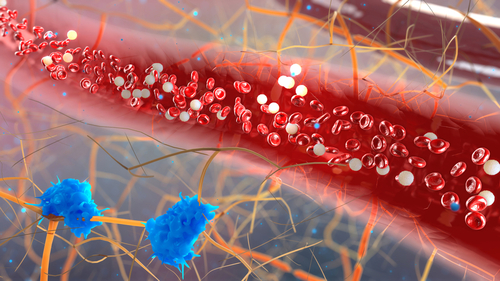Blood Biomarker Able to Quickly Diagnose Active ANCA Vasculitis as Distinct from Infections, Study Reports
Written by |

A molecule known as chemokine receptor 8 (CCR8) can be seen at significantly high levels in people with active ANCA-associated vasculitis and serve as a blood biomarker of disease activity of importance to treatment, because its serum levels do not alter with infections, a study in Japan reports.
Specifically, blood serum levels of CCR8 may help physicians distinguish between patients with active vasculitis from those with infections — whether bacterial, fungal, or viral — allowing appropriate treatment to be given quickly to limit organ damage.
The study, “Chemokine Receptor 8 Can Distinguish Antineutrophil Cytoplasmic Antibody–Associated Vasculitis From Infectious Complications,” was published in the journal Kidney International Reports.
Infection is a major cause of death in patients with ANCA-associated vasculitis, a disease that is characterized by inflammation of small blood vessels.
Diagnosing and treating vasculitis quickly is vital, as proper treatment “started immediately … [can] prevent progressive organ damage due to inflamed vessels.”
But because disease symptoms are often non-specific and common, such as fever, cough, and pain, doctors often treat for an infectious disorder first. A blood biomarker distinguishing active vasculitis from a common infection could be of considerable help in a quicker and accurate diagnosis.
Earlier studies found that levels of an antibody known as ANCA is associated with the presence of vasculitis and can be useful for assessing disease activity. But later research showed a less than complete link between ANCA levels and disease activity.
One study found the chemokine ligand 18 (CCL18) molecule boosted the disease activity of ANCA-associated vasculitis. In fact, researchers found that CCL18 was present at high levels in patients during active vasculitis and relapse, but at lower levels during remission.
Generally, vasculitis is diagnosed using tests that look for very general and non-specific inflammatory markers, such as erythrocyte sedimentation rate and C-reactive protein (CRP) levels. However, these markers are elevated across a wide range of illnesses, including infections.
As CCL18 appears to be specific to vasculitis disease activity, it could serve as a marker of changes in disease status rather than one that responds to infectious complications. CCL18 is secreted mainly by cells involved in the first line of defense, and activates its receptor CCR8, a protein that resides on the surface of other immune cells.
The researchers set out to measure CCR8 levels in immune cells found in the blood of people with various types of vasculitis. Their goal was to determine if CCR8 levels might help to distinguish vasculitis activity from infectious inflammation.
Their cross-sectional study involved 113 systemic vasculitis patients treated at or referred to the Japan Health Care Organization Sendai Hospital from 2014 to 2016. Immune cells were extracted from their blood, and CCR8 expression determined.
As hypothesized, results indicated that CCR8 levels were significantly higher in patients with ANCA-associated vasculitis.
Patients with other types of vasculitis, including lupus nephritis (inflammation of the kidney) and Henoch-Schonlein purpura (inflammation and bleeding of small blood vessels in the skin, joints, and intestines), did not show increased CCR8 levels.
CCR8 levels were also higher in people in the active phase of ANCA-associated vasculitis, while those in remission had lower levels — showing that disease activity correlated with blood levels of the CCR8 molecule.
“Although the sample number was small, CCR8 could be a sensitive indicator of active ANCA-associated vasculitis,” the investigators wrote, and one that is not affected by a common infection.
“Distinguishing disease activity and infection has been the most controversial issue in vasculitis treatment, because the major cause of death in ANCA-associated vasculitis is infection,” they concluded. “Therefore, preventing infectious complications and avoiding unnecessary immunosuppression with accurate diagnosis is considered as the highest priority. Consequently, this marker could have a great significance in vasculitis treatment.”
Importantly, the team also showed that CCR8 levels in relapsing ANCA-associated vasculitis patients do not rise “even on treatment with immunosuppressive drugs, suggesting that immunosuppressants do not undermine the CCR8 expression in active vasculitis.”
And, they added, this blood biomarker allows for “rapid diagnosis” of active disease, possibly in as a little as four hours “ using the polymerase chain reaction method.”





